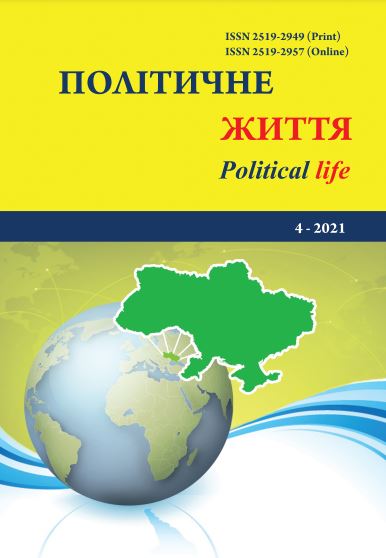Trust as a political and psychological phenomenon
DOI:
https://doi.org/10.31558/2519-2949.2021.4.10Keywords:
trust; values; social interaction; political thinking; rational and irrational in politics; political cultureAbstract
The article is devoted to the analysis of trust as a political and psychological phenomenon. The focus is on the fact that trust is the value basis of social interaction, it is emphasized that the effectiveness of this interaction is based on the coincidence of values, which, to a large extent, ensures value-oriented unity. It is emphasized that the uniqueness of the phenomenon of trust lies in a peculiar combination of rational and irrational bases of assessments and judgments. It is proved that trust, on the one hand, is the result of a posteriori cognition and follows from experience, is based on analysis and synthesis of events, phenomenas, processes, evaluation of behavior, etc., on the other – is based on irrational motives that rely on intuition, own or stereotyped ideas about the proper, desirable, probable because of its predominantly emotional perception. The role of trust as an important factor of state-building processes in the conditions of national, state self-determination and overcoming of social and political crises is substantiated. Particular attention is paid to the role of trust in the process of legitimation of power, the problem of trust in the context of interaction between branches of government, political and state institutions is actualized. It is proved that trust as a political and psychological phenomenon is a powerful factor and regulator of socio-political processes, an element of the architecture of the system of social and institutional interaction and a kind of its provision. In the context of socio-political interaction, the socio-psychological basis for distinguishing between the concepts of "trust" and "faith", "trust" and "distrust" is revealed. The characteristic features and certain functions of trust as a socio-cultural and political-psychological phenomenon are outlined. Emphasis is placed on the cognitive function of trust, in particular, on the need to develop political thinking as an analytical prerequisite for trust and a necessary component of political culture.
References
Бек У. Общество риска. На пути к другому модерну / пер. с нем. В. Седельника и Н. Федоровой; послесл. А. Филиппова. М. : Прогресс-Традиция, 2000. 384 с.
Бурдье П. Социология политики / сост., общ. ред. и предисл. Н. А. Шматко. M. : Socio-Logos, 1993. 336 с.
Бурдье П. Формы капитала. DOI: 10.17323/1726-3247-2002-5-60-74
Гидденс Э. Устроение общества. Очерк теории структурации / пер. з англ.; 2-е изд. М. : Академический Проект, 2005. 528 с.
Lipset S. M. Political Man. Anchor Books, Garden City, New York, 1960. 477p.
Луман Н. Власть / пер. с нем. А. Ю. Антоновского. М. : Праксис, 2001. 256 с.
Маслоу А. Мотивация и личность / пер. с англ. А. М. Татлыбаевой. Санкт-Петербург : Евразия, 2001. 479 с.
Парсонс Т. Система современных обществ / пер. с англ. Л. А. Седова и А. Д. Ковалева; под ред. М. С. Ковалевой. М. : Аспект-Пресс, 1998. 270 с.
Селигмен А. Проблема доверия / пер. с англ. И. И. Мюрберг, Л. В. Соболевой. М. : Идея-Пресс, 2002. 256 с.
Фукуяма Ф. Доверие: социальные добродетели и путь к процветанию / пер. с англ. М. : ООО «Издательство ACT», 2004. 730 с.
Sztompka P. Trust: a sociological theory. Cambridge : Cambridge university press, 1999. 214 p.
Штомпка П. Доверие в эпоху глобализации. Социальная политика и социология. 2006. № 4. С. 8–15.
Бова А. Довіра до соціальних інститутів: крос-національні зіставлення. Соціальна психологія. 2004. № 2 (4). C. 90–99.
Общество без доверия / под. ред. Е. Головахи, Н. Костенко, С. Макеева. Киев : Институт социологии НАН Украины, 2014. 338 с.
Денисюк С. Г. Довіра як чинник ефективності політичної комунікації. Вісник Харківського національного університету імені В. Н. Каразіна. Серія: Питання політології. 2011. № 984. Вип. 19. С. 171–176.
Ручка А. О. Соціокультурне підґрунтя демократичної консолідації. Українське суспільство 1992–2006. Соціологічний моніторинг / за ред. В. Ворони, М. Шульги. Київ : Інститут соціології НАН України, 2006. С. 347–355.
Щедрова Г. Чинник довіри як інструмент політичних технологій. Гілея: науковий вісник. 2020. Вип. № 154 (3). С. 335–341.
Эриксон Э. Идентичность: юность и кризис / пер. с англ., общ. ред. и предисл. А. В. Толстых. М. : Издательская группа «Прогресс», 1996. 344 с.
Шайгородський Ю. Ціннісні орієнтації в психологічній структурі особистості. Соціальна психологія. 2009. № 4 (36). C. 65–73.
Сичова А. Феномен політичної довіри крізь призму концепції легітимності. Науковий вісник Ужгородського університету. Серія: Політологія, Соціологія, Філософія. 2010. Вип. 14. С. 53–55.
Постригань Г. Поведінка політична. Політична енциклопедія / редкол.: Ю. Левенець (голова), Ю. Шаповал (заст. голови) та ін. Київ : Парламентське видавництво, 2011. 808 с.
Шайгородський Ю. Криза суспільної довіри: суперечність між очікуваннями та реальністю. Політичне поле України у ситуації суспільної кризи: влада, опозиція, політичні партії, громадські організації / за ред. О. Майбороди. Київ : ІПіЕнД ім. І. Ф. Кураса НАН України. 264 с.

